International Business Law: Regulations, Trade, and Investment
VerifiedAdded on 2020/02/05
|9
|3393
|35
Report
AI Summary
This report provides a comprehensive overview of international business law, examining the processes of international trade and foreign direct investment (FDI). It explores the regulatory frameworks governing these activities, highlighting the impact of both national and international laws. The report delves into common trade barriers such as tariffs, quotas, and non-tariff barriers, analyzing their effects on international business operations and market dynamics. It also discusses the role of government in promoting FDI and the various barriers that may be imposed, including restrictions on foreign investors and discriminatory practices. The report further examines different methods and types of FDI, such as commercial loans and official flows, and how these influence international trade. Finally, the report emphasizes the importance of regulatory compliance and the impact of international trade regulations on businesses, including compliance with different rules and regulations which directly affect their ability to conduct a business or expand its operations, and the need for both national and international regulations to facilitate effective trade and investment. This report is available on Desklib to assist students with their studies.
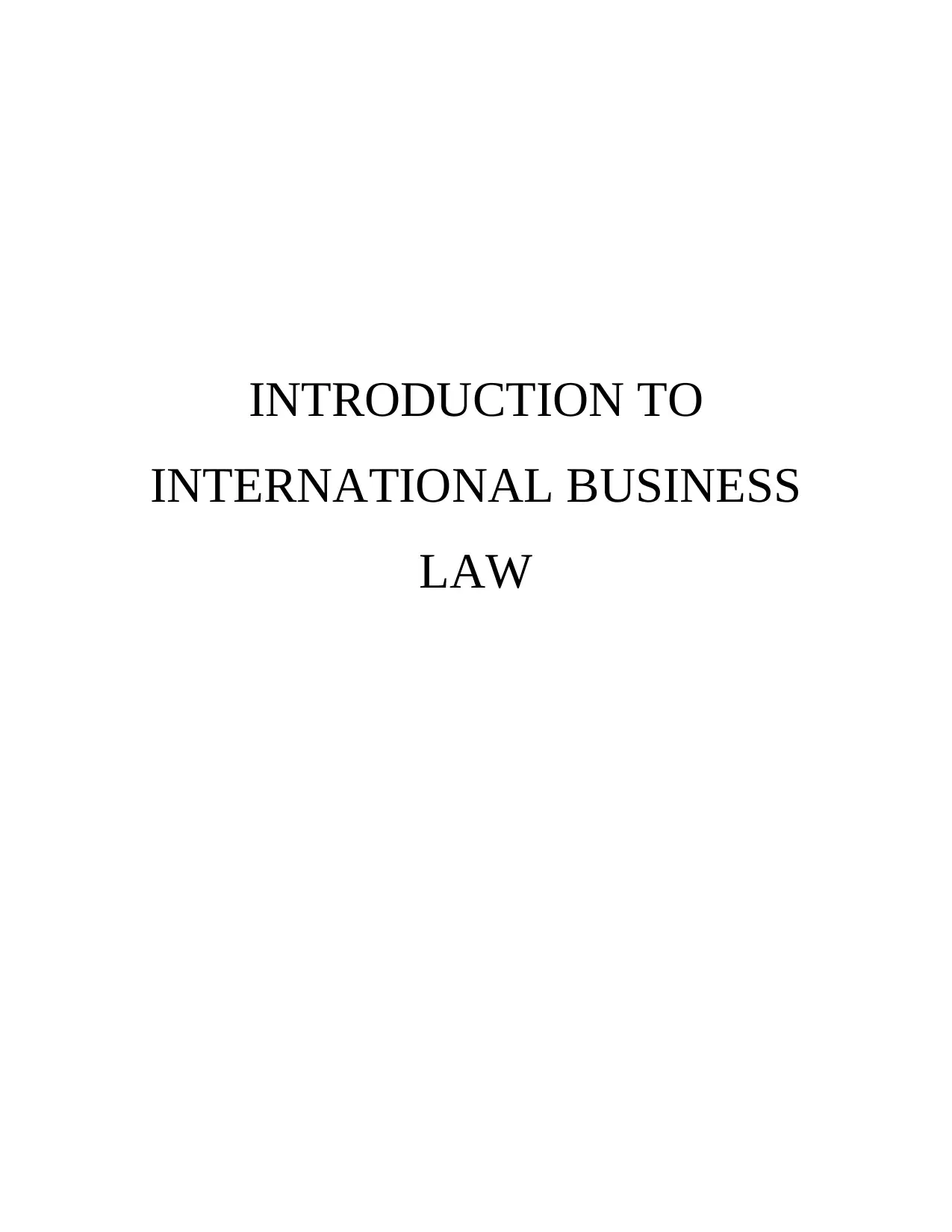
INTRODUCTION TO
INTERNATIONAL BUSINESS
LAW
INTERNATIONAL BUSINESS
LAW
Paraphrase This Document
Need a fresh take? Get an instant paraphrase of this document with our AI Paraphraser
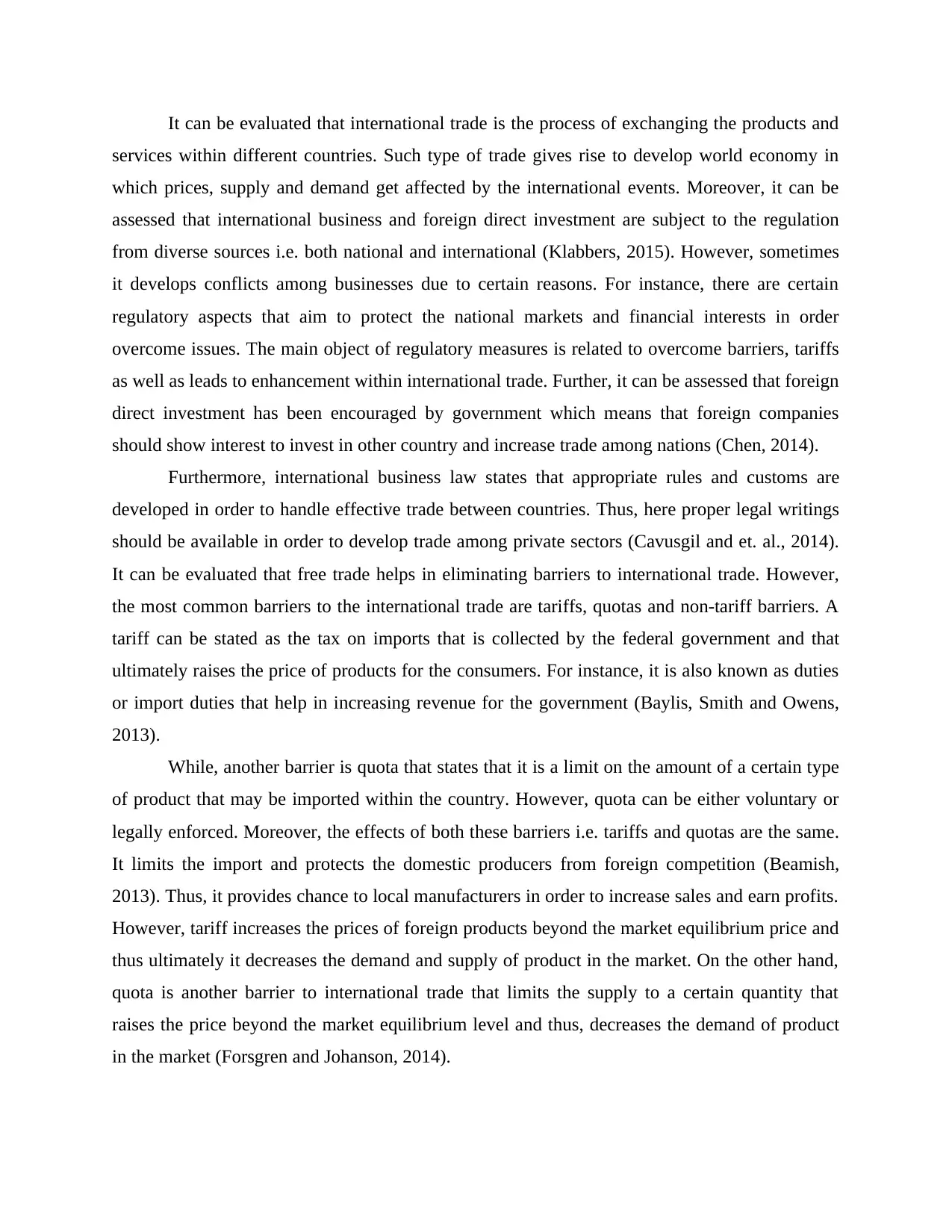
It can be evaluated that international trade is the process of exchanging the products and
services within different countries. Such type of trade gives rise to develop world economy in
which prices, supply and demand get affected by the international events. Moreover, it can be
assessed that international business and foreign direct investment are subject to the regulation
from diverse sources i.e. both national and international (Klabbers, 2015). However, sometimes
it develops conflicts among businesses due to certain reasons. For instance, there are certain
regulatory aspects that aim to protect the national markets and financial interests in order
overcome issues. The main object of regulatory measures is related to overcome barriers, tariffs
as well as leads to enhancement within international trade. Further, it can be assessed that foreign
direct investment has been encouraged by government which means that foreign companies
should show interest to invest in other country and increase trade among nations (Chen, 2014).
Furthermore, international business law states that appropriate rules and customs are
developed in order to handle effective trade between countries. Thus, here proper legal writings
should be available in order to develop trade among private sectors (Cavusgil and et. al., 2014).
It can be evaluated that free trade helps in eliminating barriers to international trade. However,
the most common barriers to the international trade are tariffs, quotas and non-tariff barriers. A
tariff can be stated as the tax on imports that is collected by the federal government and that
ultimately raises the price of products for the consumers. For instance, it is also known as duties
or import duties that help in increasing revenue for the government (Baylis, Smith and Owens,
2013).
While, another barrier is quota that states that it is a limit on the amount of a certain type
of product that may be imported within the country. However, quota can be either voluntary or
legally enforced. Moreover, the effects of both these barriers i.e. tariffs and quotas are the same.
It limits the import and protects the domestic producers from foreign competition (Beamish,
2013). Thus, it provides chance to local manufacturers in order to increase sales and earn profits.
However, tariff increases the prices of foreign products beyond the market equilibrium price and
thus ultimately it decreases the demand and supply of product in the market. On the other hand,
quota is another barrier to international trade that limits the supply to a certain quantity that
raises the price beyond the market equilibrium level and thus, decreases the demand of product
in the market (Forsgren and Johanson, 2014).
services within different countries. Such type of trade gives rise to develop world economy in
which prices, supply and demand get affected by the international events. Moreover, it can be
assessed that international business and foreign direct investment are subject to the regulation
from diverse sources i.e. both national and international (Klabbers, 2015). However, sometimes
it develops conflicts among businesses due to certain reasons. For instance, there are certain
regulatory aspects that aim to protect the national markets and financial interests in order
overcome issues. The main object of regulatory measures is related to overcome barriers, tariffs
as well as leads to enhancement within international trade. Further, it can be assessed that foreign
direct investment has been encouraged by government which means that foreign companies
should show interest to invest in other country and increase trade among nations (Chen, 2014).
Furthermore, international business law states that appropriate rules and customs are
developed in order to handle effective trade between countries. Thus, here proper legal writings
should be available in order to develop trade among private sectors (Cavusgil and et. al., 2014).
It can be evaluated that free trade helps in eliminating barriers to international trade. However,
the most common barriers to the international trade are tariffs, quotas and non-tariff barriers. A
tariff can be stated as the tax on imports that is collected by the federal government and that
ultimately raises the price of products for the consumers. For instance, it is also known as duties
or import duties that help in increasing revenue for the government (Baylis, Smith and Owens,
2013).
While, another barrier is quota that states that it is a limit on the amount of a certain type
of product that may be imported within the country. However, quota can be either voluntary or
legally enforced. Moreover, the effects of both these barriers i.e. tariffs and quotas are the same.
It limits the import and protects the domestic producers from foreign competition (Beamish,
2013). Thus, it provides chance to local manufacturers in order to increase sales and earn profits.
However, tariff increases the prices of foreign products beyond the market equilibrium price and
thus ultimately it decreases the demand and supply of product in the market. On the other hand,
quota is another barrier to international trade that limits the supply to a certain quantity that
raises the price beyond the market equilibrium level and thus, decreases the demand of product
in the market (Forsgren and Johanson, 2014).
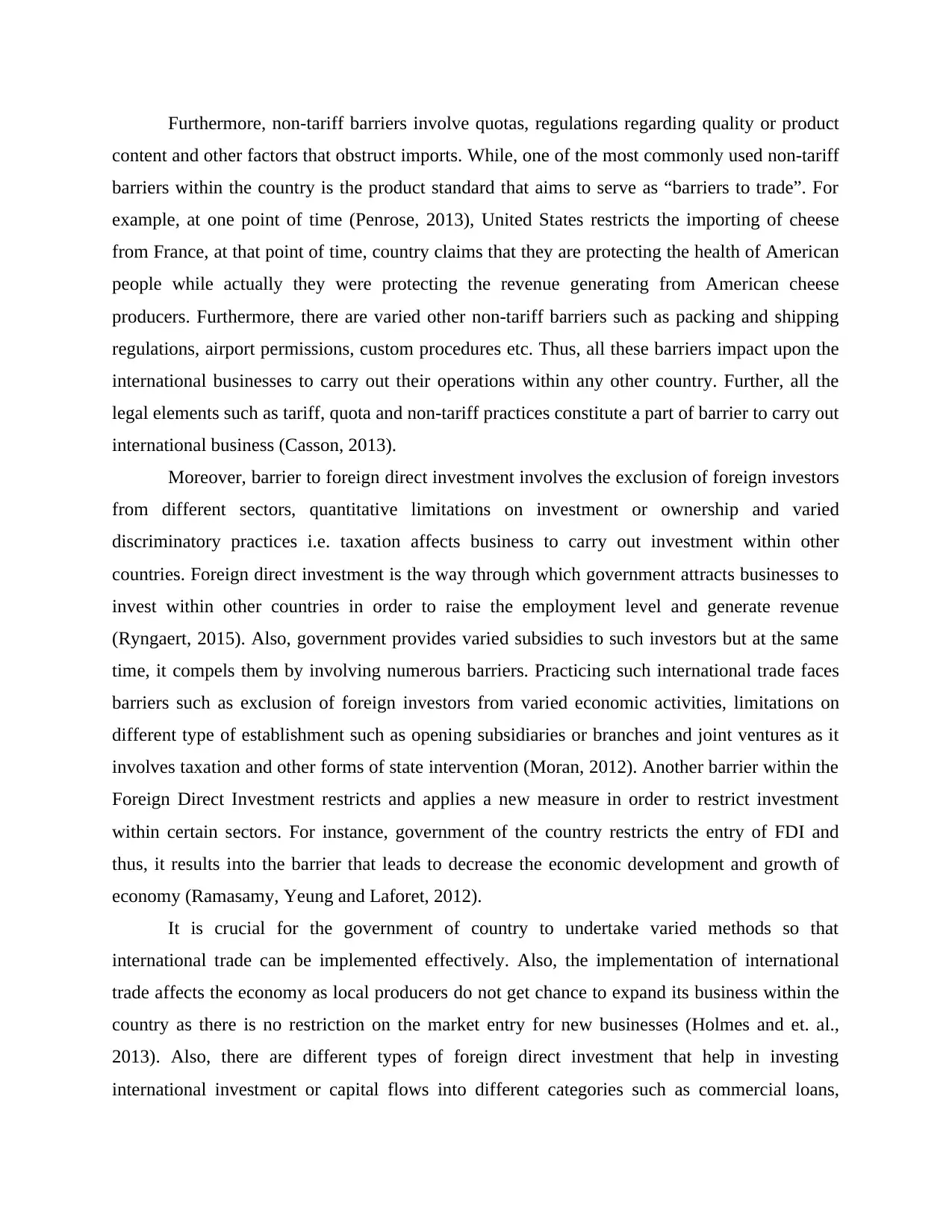
Furthermore, non-tariff barriers involve quotas, regulations regarding quality or product
content and other factors that obstruct imports. While, one of the most commonly used non-tariff
barriers within the country is the product standard that aims to serve as “barriers to trade”. For
example, at one point of time (Penrose, 2013), United States restricts the importing of cheese
from France, at that point of time, country claims that they are protecting the health of American
people while actually they were protecting the revenue generating from American cheese
producers. Furthermore, there are varied other non-tariff barriers such as packing and shipping
regulations, airport permissions, custom procedures etc. Thus, all these barriers impact upon the
international businesses to carry out their operations within any other country. Further, all the
legal elements such as tariff, quota and non-tariff practices constitute a part of barrier to carry out
international business (Casson, 2013).
Moreover, barrier to foreign direct investment involves the exclusion of foreign investors
from different sectors, quantitative limitations on investment or ownership and varied
discriminatory practices i.e. taxation affects business to carry out investment within other
countries. Foreign direct investment is the way through which government attracts businesses to
invest within other countries in order to raise the employment level and generate revenue
(Ryngaert, 2015). Also, government provides varied subsidies to such investors but at the same
time, it compels them by involving numerous barriers. Practicing such international trade faces
barriers such as exclusion of foreign investors from varied economic activities, limitations on
different type of establishment such as opening subsidiaries or branches and joint ventures as it
involves taxation and other forms of state intervention (Moran, 2012). Another barrier within the
Foreign Direct Investment restricts and applies a new measure in order to restrict investment
within certain sectors. For instance, government of the country restricts the entry of FDI and
thus, it results into the barrier that leads to decrease the economic development and growth of
economy (Ramasamy, Yeung and Laforet, 2012).
It is crucial for the government of country to undertake varied methods so that
international trade can be implemented effectively. Also, the implementation of international
trade affects the economy as local producers do not get chance to expand its business within the
country as there is no restriction on the market entry for new businesses (Holmes and et. al.,
2013). Also, there are different types of foreign direct investment that help in investing
international investment or capital flows into different categories such as commercial loans,
content and other factors that obstruct imports. While, one of the most commonly used non-tariff
barriers within the country is the product standard that aims to serve as “barriers to trade”. For
example, at one point of time (Penrose, 2013), United States restricts the importing of cheese
from France, at that point of time, country claims that they are protecting the health of American
people while actually they were protecting the revenue generating from American cheese
producers. Furthermore, there are varied other non-tariff barriers such as packing and shipping
regulations, airport permissions, custom procedures etc. Thus, all these barriers impact upon the
international businesses to carry out their operations within any other country. Further, all the
legal elements such as tariff, quota and non-tariff practices constitute a part of barrier to carry out
international business (Casson, 2013).
Moreover, barrier to foreign direct investment involves the exclusion of foreign investors
from different sectors, quantitative limitations on investment or ownership and varied
discriminatory practices i.e. taxation affects business to carry out investment within other
countries. Foreign direct investment is the way through which government attracts businesses to
invest within other countries in order to raise the employment level and generate revenue
(Ryngaert, 2015). Also, government provides varied subsidies to such investors but at the same
time, it compels them by involving numerous barriers. Practicing such international trade faces
barriers such as exclusion of foreign investors from varied economic activities, limitations on
different type of establishment such as opening subsidiaries or branches and joint ventures as it
involves taxation and other forms of state intervention (Moran, 2012). Another barrier within the
Foreign Direct Investment restricts and applies a new measure in order to restrict investment
within certain sectors. For instance, government of the country restricts the entry of FDI and
thus, it results into the barrier that leads to decrease the economic development and growth of
economy (Ramasamy, Yeung and Laforet, 2012).
It is crucial for the government of country to undertake varied methods so that
international trade can be implemented effectively. Also, the implementation of international
trade affects the economy as local producers do not get chance to expand its business within the
country as there is no restriction on the market entry for new businesses (Holmes and et. al.,
2013). Also, there are different types of foreign direct investment that help in investing
international investment or capital flows into different categories such as commercial loans,
⊘ This is a preview!⊘
Do you want full access?
Subscribe today to unlock all pages.

Trusted by 1+ million students worldwide
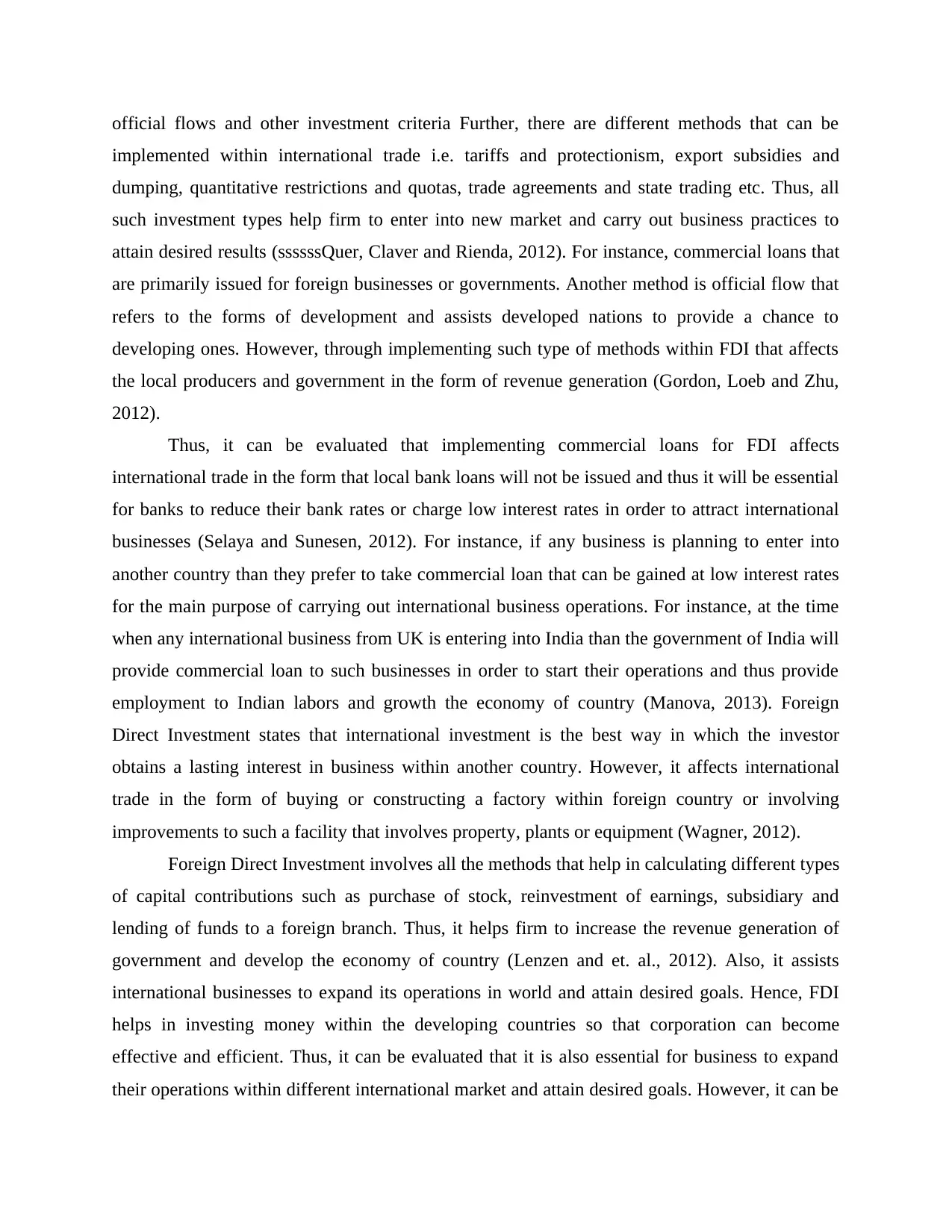
official flows and other investment criteria Further, there are different methods that can be
implemented within international trade i.e. tariffs and protectionism, export subsidies and
dumping, quantitative restrictions and quotas, trade agreements and state trading etc. Thus, all
such investment types help firm to enter into new market and carry out business practices to
attain desired results (ssssssQuer, Claver and Rienda, 2012). For instance, commercial loans that
are primarily issued for foreign businesses or governments. Another method is official flow that
refers to the forms of development and assists developed nations to provide a chance to
developing ones. However, through implementing such type of methods within FDI that affects
the local producers and government in the form of revenue generation (Gordon, Loeb and Zhu,
2012).
Thus, it can be evaluated that implementing commercial loans for FDI affects
international trade in the form that local bank loans will not be issued and thus it will be essential
for banks to reduce their bank rates or charge low interest rates in order to attract international
businesses (Selaya and Sunesen, 2012). For instance, if any business is planning to enter into
another country than they prefer to take commercial loan that can be gained at low interest rates
for the main purpose of carrying out international business operations. For instance, at the time
when any international business from UK is entering into India than the government of India will
provide commercial loan to such businesses in order to start their operations and thus provide
employment to Indian labors and growth the economy of country (Manova, 2013). Foreign
Direct Investment states that international investment is the best way in which the investor
obtains a lasting interest in business within another country. However, it affects international
trade in the form of buying or constructing a factory within foreign country or involving
improvements to such a facility that involves property, plants or equipment (Wagner, 2012).
Foreign Direct Investment involves all the methods that help in calculating different types
of capital contributions such as purchase of stock, reinvestment of earnings, subsidiary and
lending of funds to a foreign branch. Thus, it helps firm to increase the revenue generation of
government and develop the economy of country (Lenzen and et. al., 2012). Also, it assists
international businesses to expand its operations in world and attain desired goals. Hence, FDI
helps in investing money within the developing countries so that corporation can become
effective and efficient. Thus, it can be evaluated that it is also essential for business to expand
their operations within different international market and attain desired goals. However, it can be
implemented within international trade i.e. tariffs and protectionism, export subsidies and
dumping, quantitative restrictions and quotas, trade agreements and state trading etc. Thus, all
such investment types help firm to enter into new market and carry out business practices to
attain desired results (ssssssQuer, Claver and Rienda, 2012). For instance, commercial loans that
are primarily issued for foreign businesses or governments. Another method is official flow that
refers to the forms of development and assists developed nations to provide a chance to
developing ones. However, through implementing such type of methods within FDI that affects
the local producers and government in the form of revenue generation (Gordon, Loeb and Zhu,
2012).
Thus, it can be evaluated that implementing commercial loans for FDI affects
international trade in the form that local bank loans will not be issued and thus it will be essential
for banks to reduce their bank rates or charge low interest rates in order to attract international
businesses (Selaya and Sunesen, 2012). For instance, if any business is planning to enter into
another country than they prefer to take commercial loan that can be gained at low interest rates
for the main purpose of carrying out international business operations. For instance, at the time
when any international business from UK is entering into India than the government of India will
provide commercial loan to such businesses in order to start their operations and thus provide
employment to Indian labors and growth the economy of country (Manova, 2013). Foreign
Direct Investment states that international investment is the best way in which the investor
obtains a lasting interest in business within another country. However, it affects international
trade in the form of buying or constructing a factory within foreign country or involving
improvements to such a facility that involves property, plants or equipment (Wagner, 2012).
Foreign Direct Investment involves all the methods that help in calculating different types
of capital contributions such as purchase of stock, reinvestment of earnings, subsidiary and
lending of funds to a foreign branch. Thus, it helps firm to increase the revenue generation of
government and develop the economy of country (Lenzen and et. al., 2012). Also, it assists
international businesses to expand its operations in world and attain desired goals. Hence, FDI
helps in investing money within the developing countries so that corporation can become
effective and efficient. Thus, it can be evaluated that it is also essential for business to expand
their operations within different international market and attain desired goals. However, it can be
Paraphrase This Document
Need a fresh take? Get an instant paraphrase of this document with our AI Paraphraser
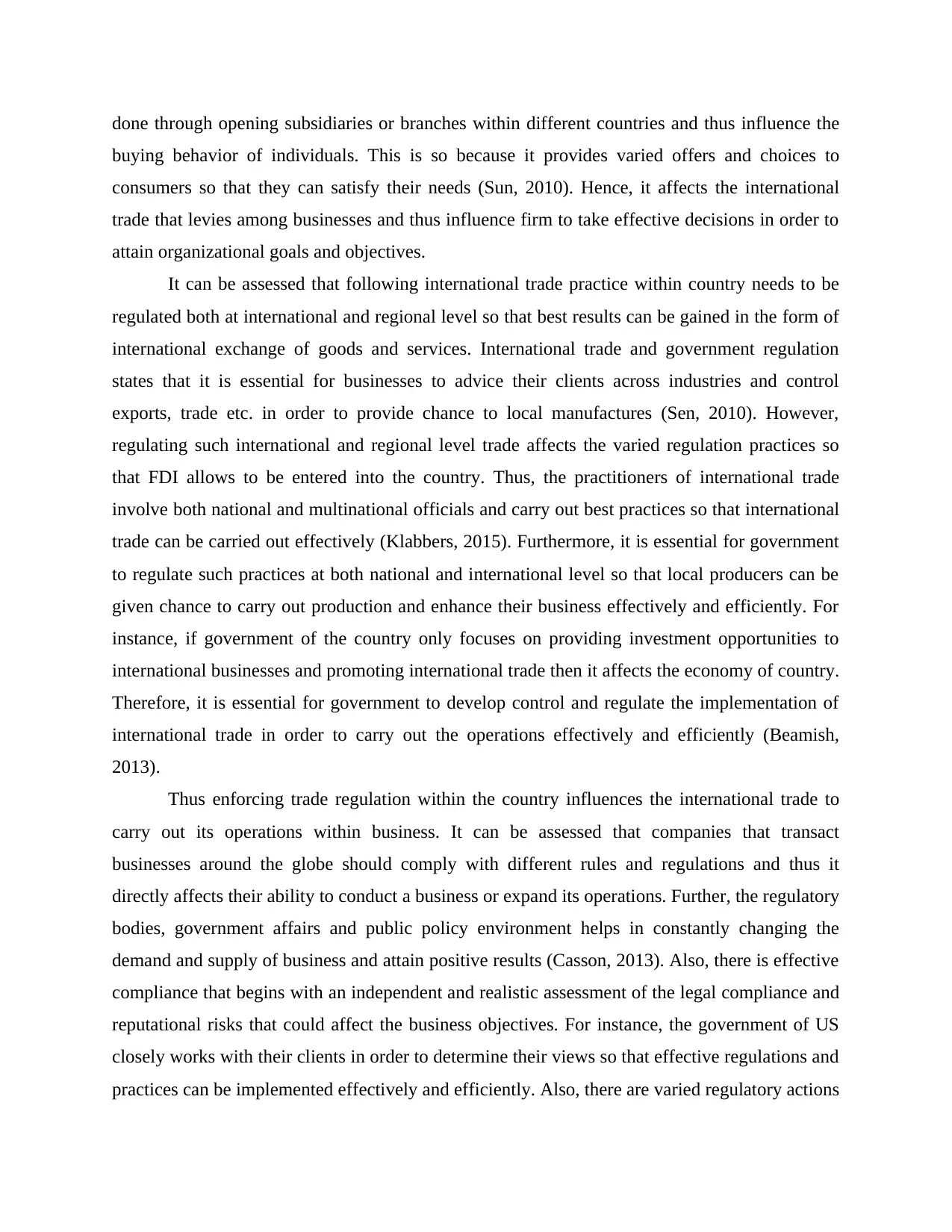
done through opening subsidiaries or branches within different countries and thus influence the
buying behavior of individuals. This is so because it provides varied offers and choices to
consumers so that they can satisfy their needs (Sun, 2010). Hence, it affects the international
trade that levies among businesses and thus influence firm to take effective decisions in order to
attain organizational goals and objectives.
It can be assessed that following international trade practice within country needs to be
regulated both at international and regional level so that best results can be gained in the form of
international exchange of goods and services. International trade and government regulation
states that it is essential for businesses to advice their clients across industries and control
exports, trade etc. in order to provide chance to local manufactures (Sen, 2010). However,
regulating such international and regional level trade affects the varied regulation practices so
that FDI allows to be entered into the country. Thus, the practitioners of international trade
involve both national and multinational officials and carry out best practices so that international
trade can be carried out effectively (Klabbers, 2015). Furthermore, it is essential for government
to regulate such practices at both national and international level so that local producers can be
given chance to carry out production and enhance their business effectively and efficiently. For
instance, if government of the country only focuses on providing investment opportunities to
international businesses and promoting international trade then it affects the economy of country.
Therefore, it is essential for government to develop control and regulate the implementation of
international trade in order to carry out the operations effectively and efficiently (Beamish,
2013).
Thus enforcing trade regulation within the country influences the international trade to
carry out its operations within business. It can be assessed that companies that transact
businesses around the globe should comply with different rules and regulations and thus it
directly affects their ability to conduct a business or expand its operations. Further, the regulatory
bodies, government affairs and public policy environment helps in constantly changing the
demand and supply of business and attain positive results (Casson, 2013). Also, there is effective
compliance that begins with an independent and realistic assessment of the legal compliance and
reputational risks that could affect the business objectives. For instance, the government of US
closely works with their clients in order to determine their views so that effective regulations and
practices can be implemented effectively and efficiently. Also, there are varied regulatory actions
buying behavior of individuals. This is so because it provides varied offers and choices to
consumers so that they can satisfy their needs (Sun, 2010). Hence, it affects the international
trade that levies among businesses and thus influence firm to take effective decisions in order to
attain organizational goals and objectives.
It can be assessed that following international trade practice within country needs to be
regulated both at international and regional level so that best results can be gained in the form of
international exchange of goods and services. International trade and government regulation
states that it is essential for businesses to advice their clients across industries and control
exports, trade etc. in order to provide chance to local manufactures (Sen, 2010). However,
regulating such international and regional level trade affects the varied regulation practices so
that FDI allows to be entered into the country. Thus, the practitioners of international trade
involve both national and multinational officials and carry out best practices so that international
trade can be carried out effectively (Klabbers, 2015). Furthermore, it is essential for government
to regulate such practices at both national and international level so that local producers can be
given chance to carry out production and enhance their business effectively and efficiently. For
instance, if government of the country only focuses on providing investment opportunities to
international businesses and promoting international trade then it affects the economy of country.
Therefore, it is essential for government to develop control and regulate the implementation of
international trade in order to carry out the operations effectively and efficiently (Beamish,
2013).
Thus enforcing trade regulation within the country influences the international trade to
carry out its operations within business. It can be assessed that companies that transact
businesses around the globe should comply with different rules and regulations and thus it
directly affects their ability to conduct a business or expand its operations. Further, the regulatory
bodies, government affairs and public policy environment helps in constantly changing the
demand and supply of business and attain positive results (Casson, 2013). Also, there is effective
compliance that begins with an independent and realistic assessment of the legal compliance and
reputational risks that could affect the business objectives. For instance, the government of US
closely works with their clients in order to determine their views so that effective regulations and
practices can be implemented effectively and efficiently. Also, there are varied regulatory actions
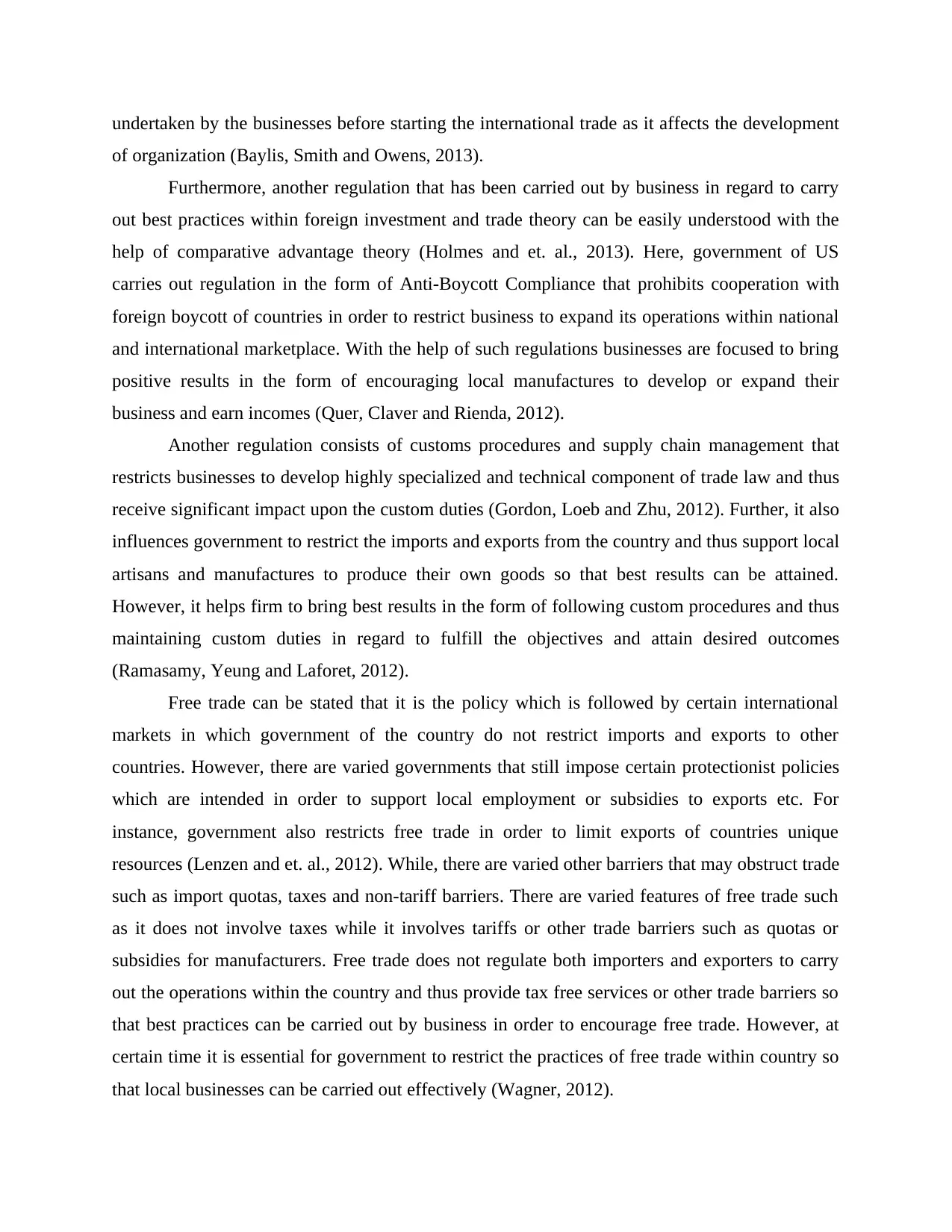
undertaken by the businesses before starting the international trade as it affects the development
of organization (Baylis, Smith and Owens, 2013).
Furthermore, another regulation that has been carried out by business in regard to carry
out best practices within foreign investment and trade theory can be easily understood with the
help of comparative advantage theory (Holmes and et. al., 2013). Here, government of US
carries out regulation in the form of Anti-Boycott Compliance that prohibits cooperation with
foreign boycott of countries in order to restrict business to expand its operations within national
and international marketplace. With the help of such regulations businesses are focused to bring
positive results in the form of encouraging local manufactures to develop or expand their
business and earn incomes (Quer, Claver and Rienda, 2012).
Another regulation consists of customs procedures and supply chain management that
restricts businesses to develop highly specialized and technical component of trade law and thus
receive significant impact upon the custom duties (Gordon, Loeb and Zhu, 2012). Further, it also
influences government to restrict the imports and exports from the country and thus support local
artisans and manufactures to produce their own goods so that best results can be attained.
However, it helps firm to bring best results in the form of following custom procedures and thus
maintaining custom duties in regard to fulfill the objectives and attain desired outcomes
(Ramasamy, Yeung and Laforet, 2012).
Free trade can be stated that it is the policy which is followed by certain international
markets in which government of the country do not restrict imports and exports to other
countries. However, there are varied governments that still impose certain protectionist policies
which are intended in order to support local employment or subsidies to exports etc. For
instance, government also restricts free trade in order to limit exports of countries unique
resources (Lenzen and et. al., 2012). While, there are varied other barriers that may obstruct trade
such as import quotas, taxes and non-tariff barriers. There are varied features of free trade such
as it does not involve taxes while it involves tariffs or other trade barriers such as quotas or
subsidies for manufacturers. Free trade does not regulate both importers and exporters to carry
out the operations within the country and thus provide tax free services or other trade barriers so
that best practices can be carried out by business in order to encourage free trade. However, at
certain time it is essential for government to restrict the practices of free trade within country so
that local businesses can be carried out effectively (Wagner, 2012).
of organization (Baylis, Smith and Owens, 2013).
Furthermore, another regulation that has been carried out by business in regard to carry
out best practices within foreign investment and trade theory can be easily understood with the
help of comparative advantage theory (Holmes and et. al., 2013). Here, government of US
carries out regulation in the form of Anti-Boycott Compliance that prohibits cooperation with
foreign boycott of countries in order to restrict business to expand its operations within national
and international marketplace. With the help of such regulations businesses are focused to bring
positive results in the form of encouraging local manufactures to develop or expand their
business and earn incomes (Quer, Claver and Rienda, 2012).
Another regulation consists of customs procedures and supply chain management that
restricts businesses to develop highly specialized and technical component of trade law and thus
receive significant impact upon the custom duties (Gordon, Loeb and Zhu, 2012). Further, it also
influences government to restrict the imports and exports from the country and thus support local
artisans and manufactures to produce their own goods so that best results can be attained.
However, it helps firm to bring best results in the form of following custom procedures and thus
maintaining custom duties in regard to fulfill the objectives and attain desired outcomes
(Ramasamy, Yeung and Laforet, 2012).
Free trade can be stated that it is the policy which is followed by certain international
markets in which government of the country do not restrict imports and exports to other
countries. However, there are varied governments that still impose certain protectionist policies
which are intended in order to support local employment or subsidies to exports etc. For
instance, government also restricts free trade in order to limit exports of countries unique
resources (Lenzen and et. al., 2012). While, there are varied other barriers that may obstruct trade
such as import quotas, taxes and non-tariff barriers. There are varied features of free trade such
as it does not involve taxes while it involves tariffs or other trade barriers such as quotas or
subsidies for manufacturers. Free trade does not regulate both importers and exporters to carry
out the operations within the country and thus provide tax free services or other trade barriers so
that best practices can be carried out by business in order to encourage free trade. However, at
certain time it is essential for government to restrict the practices of free trade within country so
that local businesses can be carried out effectively (Wagner, 2012).
⊘ This is a preview!⊘
Do you want full access?
Subscribe today to unlock all pages.

Trusted by 1+ million students worldwide
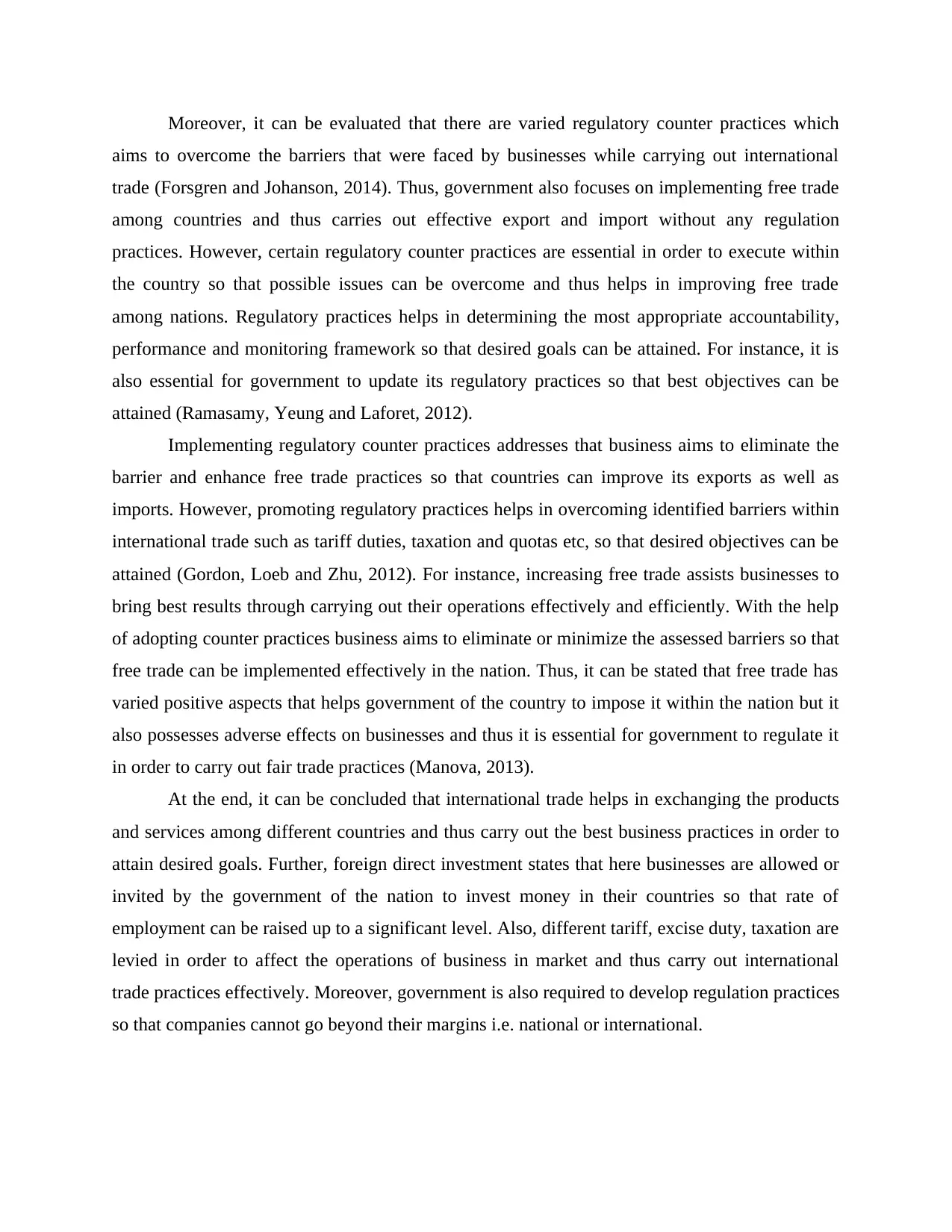
Moreover, it can be evaluated that there are varied regulatory counter practices which
aims to overcome the barriers that were faced by businesses while carrying out international
trade (Forsgren and Johanson, 2014). Thus, government also focuses on implementing free trade
among countries and thus carries out effective export and import without any regulation
practices. However, certain regulatory counter practices are essential in order to execute within
the country so that possible issues can be overcome and thus helps in improving free trade
among nations. Regulatory practices helps in determining the most appropriate accountability,
performance and monitoring framework so that desired goals can be attained. For instance, it is
also essential for government to update its regulatory practices so that best objectives can be
attained (Ramasamy, Yeung and Laforet, 2012).
Implementing regulatory counter practices addresses that business aims to eliminate the
barrier and enhance free trade practices so that countries can improve its exports as well as
imports. However, promoting regulatory practices helps in overcoming identified barriers within
international trade such as tariff duties, taxation and quotas etc, so that desired objectives can be
attained (Gordon, Loeb and Zhu, 2012). For instance, increasing free trade assists businesses to
bring best results through carrying out their operations effectively and efficiently. With the help
of adopting counter practices business aims to eliminate or minimize the assessed barriers so that
free trade can be implemented effectively in the nation. Thus, it can be stated that free trade has
varied positive aspects that helps government of the country to impose it within the nation but it
also possesses adverse effects on businesses and thus it is essential for government to regulate it
in order to carry out fair trade practices (Manova, 2013).
At the end, it can be concluded that international trade helps in exchanging the products
and services among different countries and thus carry out the best business practices in order to
attain desired goals. Further, foreign direct investment states that here businesses are allowed or
invited by the government of the nation to invest money in their countries so that rate of
employment can be raised up to a significant level. Also, different tariff, excise duty, taxation are
levied in order to affect the operations of business in market and thus carry out international
trade practices effectively. Moreover, government is also required to develop regulation practices
so that companies cannot go beyond their margins i.e. national or international.
aims to overcome the barriers that were faced by businesses while carrying out international
trade (Forsgren and Johanson, 2014). Thus, government also focuses on implementing free trade
among countries and thus carries out effective export and import without any regulation
practices. However, certain regulatory counter practices are essential in order to execute within
the country so that possible issues can be overcome and thus helps in improving free trade
among nations. Regulatory practices helps in determining the most appropriate accountability,
performance and monitoring framework so that desired goals can be attained. For instance, it is
also essential for government to update its regulatory practices so that best objectives can be
attained (Ramasamy, Yeung and Laforet, 2012).
Implementing regulatory counter practices addresses that business aims to eliminate the
barrier and enhance free trade practices so that countries can improve its exports as well as
imports. However, promoting regulatory practices helps in overcoming identified barriers within
international trade such as tariff duties, taxation and quotas etc, so that desired objectives can be
attained (Gordon, Loeb and Zhu, 2012). For instance, increasing free trade assists businesses to
bring best results through carrying out their operations effectively and efficiently. With the help
of adopting counter practices business aims to eliminate or minimize the assessed barriers so that
free trade can be implemented effectively in the nation. Thus, it can be stated that free trade has
varied positive aspects that helps government of the country to impose it within the nation but it
also possesses adverse effects on businesses and thus it is essential for government to regulate it
in order to carry out fair trade practices (Manova, 2013).
At the end, it can be concluded that international trade helps in exchanging the products
and services among different countries and thus carry out the best business practices in order to
attain desired goals. Further, foreign direct investment states that here businesses are allowed or
invited by the government of the nation to invest money in their countries so that rate of
employment can be raised up to a significant level. Also, different tariff, excise duty, taxation are
levied in order to affect the operations of business in market and thus carry out international
trade practices effectively. Moreover, government is also required to develop regulation practices
so that companies cannot go beyond their margins i.e. national or international.
Paraphrase This Document
Need a fresh take? Get an instant paraphrase of this document with our AI Paraphraser
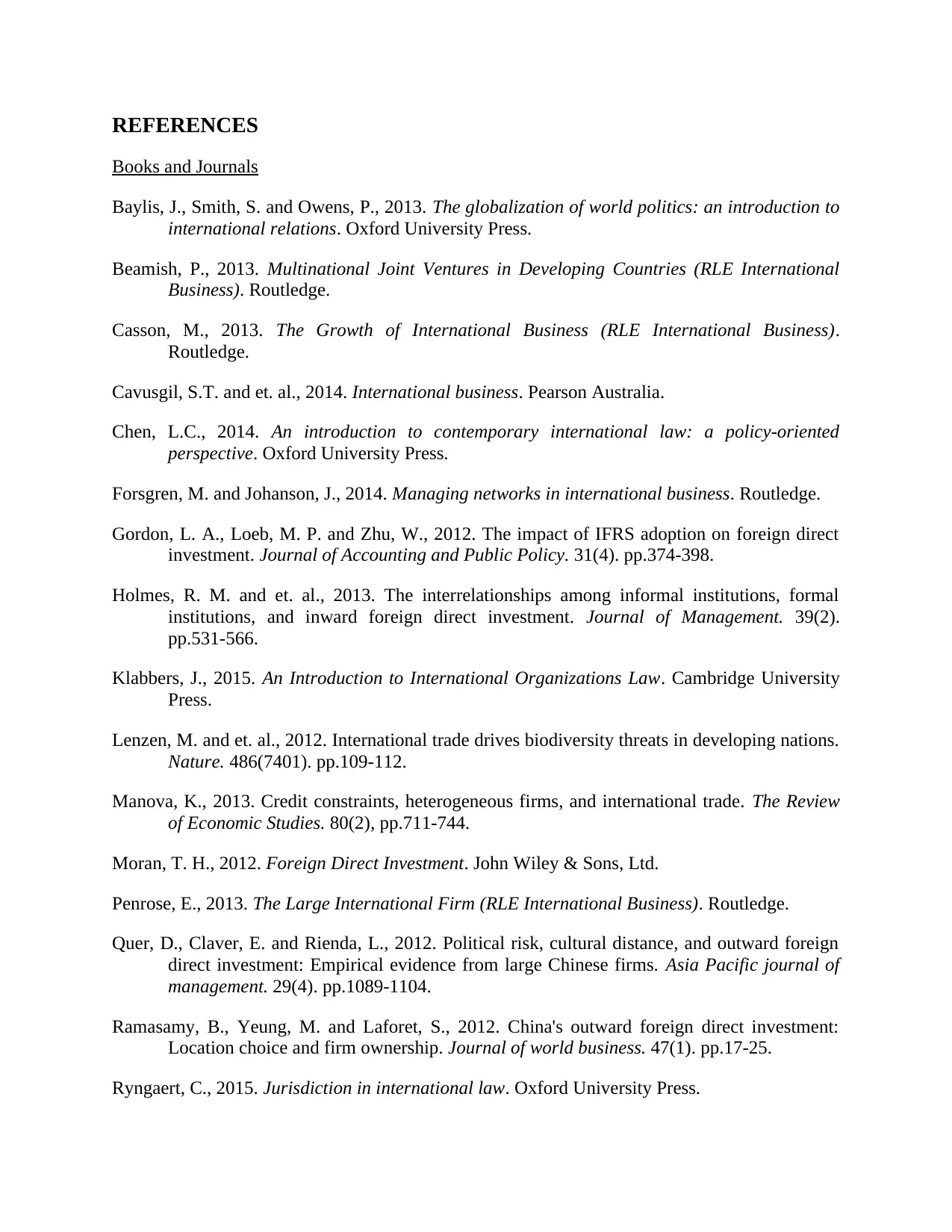
REFERENCES
Books and Journals
Baylis, J., Smith, S. and Owens, P., 2013. The globalization of world politics: an introduction to
international relations. Oxford University Press.
Beamish, P., 2013. Multinational Joint Ventures in Developing Countries (RLE International
Business). Routledge.
Casson, M., 2013. The Growth of International Business (RLE International Business).
Routledge.
Cavusgil, S.T. and et. al., 2014. International business. Pearson Australia.
Chen, L.C., 2014. An introduction to contemporary international law: a policy-oriented
perspective. Oxford University Press.
Forsgren, M. and Johanson, J., 2014. Managing networks in international business. Routledge.
Gordon, L. A., Loeb, M. P. and Zhu, W., 2012. The impact of IFRS adoption on foreign direct
investment. Journal of Accounting and Public Policy. 31(4). pp.374-398.
Holmes, R. M. and et. al., 2013. The interrelationships among informal institutions, formal
institutions, and inward foreign direct investment. Journal of Management. 39(2).
pp.531-566.
Klabbers, J., 2015. An Introduction to International Organizations Law. Cambridge University
Press.
Lenzen, M. and et. al., 2012. International trade drives biodiversity threats in developing nations.
Nature. 486(7401). pp.109-112.
Manova, K., 2013. Credit constraints, heterogeneous firms, and international trade. The Review
of Economic Studies. 80(2), pp.711-744.
Moran, T. H., 2012. Foreign Direct Investment. John Wiley & Sons, Ltd.
Penrose, E., 2013. The Large International Firm (RLE International Business). Routledge.
Quer, D., Claver, E. and Rienda, L., 2012. Political risk, cultural distance, and outward foreign
direct investment: Empirical evidence from large Chinese firms. Asia Pacific journal of
management. 29(4). pp.1089-1104.
Ramasamy, B., Yeung, M. and Laforet, S., 2012. China's outward foreign direct investment:
Location choice and firm ownership. Journal of world business. 47(1). pp.17-25.
Ryngaert, C., 2015. Jurisdiction in international law. Oxford University Press.
Books and Journals
Baylis, J., Smith, S. and Owens, P., 2013. The globalization of world politics: an introduction to
international relations. Oxford University Press.
Beamish, P., 2013. Multinational Joint Ventures in Developing Countries (RLE International
Business). Routledge.
Casson, M., 2013. The Growth of International Business (RLE International Business).
Routledge.
Cavusgil, S.T. and et. al., 2014. International business. Pearson Australia.
Chen, L.C., 2014. An introduction to contemporary international law: a policy-oriented
perspective. Oxford University Press.
Forsgren, M. and Johanson, J., 2014. Managing networks in international business. Routledge.
Gordon, L. A., Loeb, M. P. and Zhu, W., 2012. The impact of IFRS adoption on foreign direct
investment. Journal of Accounting and Public Policy. 31(4). pp.374-398.
Holmes, R. M. and et. al., 2013. The interrelationships among informal institutions, formal
institutions, and inward foreign direct investment. Journal of Management. 39(2).
pp.531-566.
Klabbers, J., 2015. An Introduction to International Organizations Law. Cambridge University
Press.
Lenzen, M. and et. al., 2012. International trade drives biodiversity threats in developing nations.
Nature. 486(7401). pp.109-112.
Manova, K., 2013. Credit constraints, heterogeneous firms, and international trade. The Review
of Economic Studies. 80(2), pp.711-744.
Moran, T. H., 2012. Foreign Direct Investment. John Wiley & Sons, Ltd.
Penrose, E., 2013. The Large International Firm (RLE International Business). Routledge.
Quer, D., Claver, E. and Rienda, L., 2012. Political risk, cultural distance, and outward foreign
direct investment: Empirical evidence from large Chinese firms. Asia Pacific journal of
management. 29(4). pp.1089-1104.
Ramasamy, B., Yeung, M. and Laforet, S., 2012. China's outward foreign direct investment:
Location choice and firm ownership. Journal of world business. 47(1). pp.17-25.
Ryngaert, C., 2015. Jurisdiction in international law. Oxford University Press.
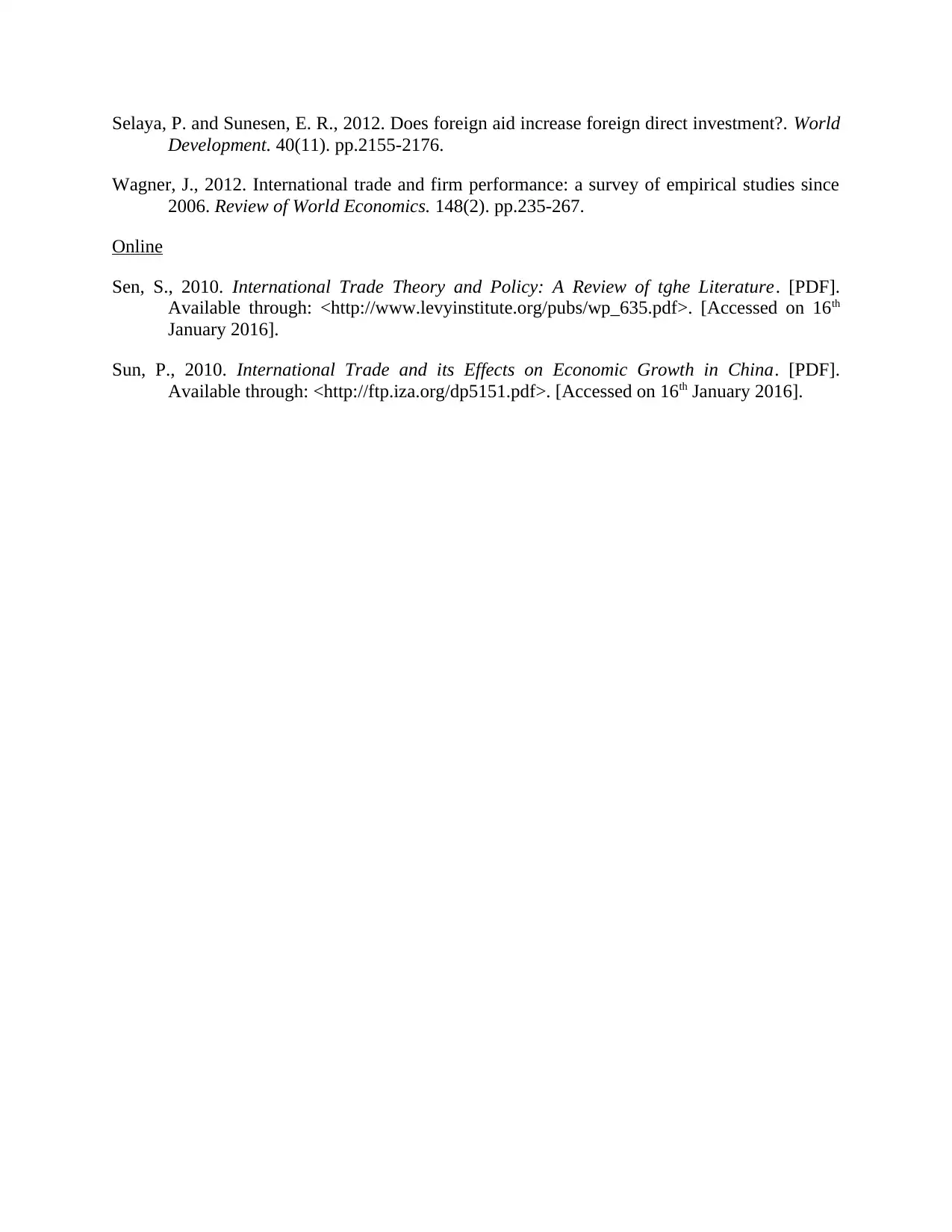
Selaya, P. and Sunesen, E. R., 2012. Does foreign aid increase foreign direct investment?. World
Development. 40(11). pp.2155-2176.
Wagner, J., 2012. International trade and firm performance: a survey of empirical studies since
2006. Review of World Economics. 148(2). pp.235-267.
Online
Sen, S., 2010. International Trade Theory and Policy: A Review of tghe Literature. [PDF].
Available through: <http://www.levyinstitute.org/pubs/wp_635.pdf>. [Accessed on 16th
January 2016].
Sun, P., 2010. International Trade and its Effects on Economic Growth in China. [PDF].
Available through: <http://ftp.iza.org/dp5151.pdf>. [Accessed on 16th January 2016].
Development. 40(11). pp.2155-2176.
Wagner, J., 2012. International trade and firm performance: a survey of empirical studies since
2006. Review of World Economics. 148(2). pp.235-267.
Online
Sen, S., 2010. International Trade Theory and Policy: A Review of tghe Literature. [PDF].
Available through: <http://www.levyinstitute.org/pubs/wp_635.pdf>. [Accessed on 16th
January 2016].
Sun, P., 2010. International Trade and its Effects on Economic Growth in China. [PDF].
Available through: <http://ftp.iza.org/dp5151.pdf>. [Accessed on 16th January 2016].
⊘ This is a preview!⊘
Do you want full access?
Subscribe today to unlock all pages.

Trusted by 1+ million students worldwide
1 out of 9
Related Documents
Your All-in-One AI-Powered Toolkit for Academic Success.
+13062052269
info@desklib.com
Available 24*7 on WhatsApp / Email
![[object Object]](/_next/static/media/star-bottom.7253800d.svg)
Unlock your academic potential
Copyright © 2020–2026 A2Z Services. All Rights Reserved. Developed and managed by ZUCOL.





